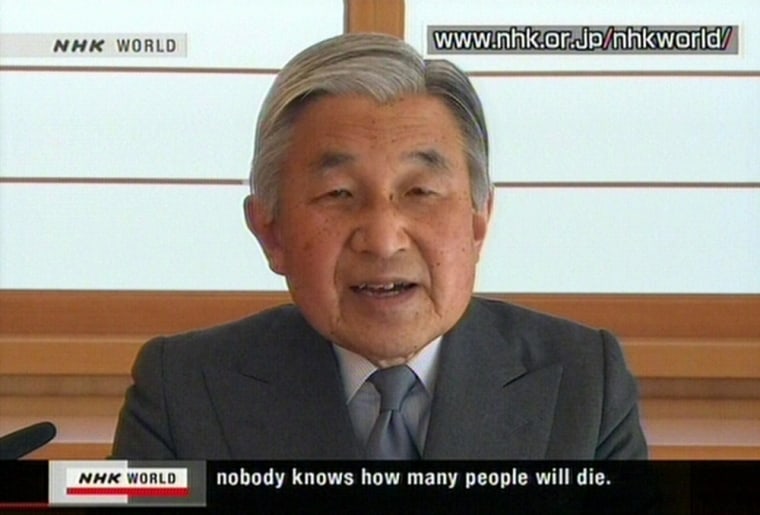Japanese Emperor Akihito made an unprecedented televised address to his disaster-stricken nation Wednesday, saying he was "deeply worried" by the crisis at damaged nuclear reactors and urging people to help each other in difficult times.
Looking somber and stoic, the 77-year-old Akihito said the problems at Japan's nuclear-power reactors were unpredictable and described the earthquake that sparked a huge tsunami as "unprecedented in scale."
TV stations interrupted coverage to carry the emperor's first public appearance since last week's catastrophe.
"I am deeply hurt by the grievous situation in the affected areas. The number of deceased and missing increases by the day we cannot know how many victims there will be. My hope is that as many people possible are found safe," Akihito said.
The plight of hundreds of thousands left homeless by the quake and tsunami worsened overnight after a cold snap brought snow to some of the worst-stricken areas. The death toll stands at 4,000, but more than 7,000 are listed as missing and the figure is expected to rise.
"I hope from the bottom of my heart that the people will, hand in hand, treat each other with compassion and overcome these difficult times," he said, urging survivors not to "abandon hope."
Akihito said he was "deeply worried" about the situation at the Dai-ichi nuclear plant in Fukushima, 150 miles north of Tokyo, where workers were trying to contain the world's worst nuclear crisis since the Chernobyl disaster in Ukraine in 1986.
Japan is reeling from what Prime Minister Naoto Kan has called its worst crisis since the end of World War Two, when the country had to rebuild from its devastating defeat.
Sifting through mounds of rubbleHeavy snow blanketed Japan's devastated northeast on Wednesday, hindering rescue workers and adding to the woes of the few, mainly elderly, residents who remained in the area worst hit by last week's massive earthquake and tsunami.
In Sendai, once a city but now a water-logged wasteland, firefighters and relief teams sifted through mounds of rubble, hoping to find any sign of life.
But, like in most other towns, rescuers just pulled out body after body, which they wrapped in brightly colored blankets and lined up neatly against the gray, grim landscape.
"The strong smell of bodies and the dirty seawater make search extremely difficult," said Yin Guanghui, a member of a Chinese rescue team working in the battered town of Ofunato.
"Powerful waves in the tsunami would repeatedly hit houses in the area. Anyone trapped under the debris would be drown in no time, without any chance to survive."
Japanese media said at least two people were pulled alive from the rubble, more than 72 hours after the earthquake and tsunami struck.
But rescue officials said the snow weakened what little chance they had of finding any more survivors.
"Snow has just come down in a blanket. Visibility is just 40 meters (131 feet)," said Patrick Fuller of the International Red Cross Federation from what remained of Otsuchi, a fishing hamlet.
"People are still working, the army is out here. But the fire service has taken off because they are worried they won't get back to their base because of the snow."
'A very tough time'Those who did survive lost everything they owned and now face shortages of food and water, no electricity or heating and frequent aftershocks that have rattled the country.
The meteorology agency said temperatures could drop as low as 28 degrees in Sendai on Wednesday.
Broadcaster NHK offered tips on how to stay warm — such as by wrapping your midsection in newspaper and cling film — and how to boil water using empty food cans and candles.
Rescuers said their main concern was for the elderly, who make up the majority of the scores of people packed into shelters.
"They are having a very tough time of it," said Fuller.
"They need regular medication and proper care. A lot of the problems, though, are psychological, people are so stressed out. They are getting three meals a day but probably more food needs to come."
In addition to their physical well-being, many elderly people at shelters were traumatized by what they had been through, and just sat huddled on blankets, waiting, but not sure for what.
"Right after the earthquake, I was told to evacuate as soon as possible. I couldn't bring anything but myself," said silver-haired Kiyoko Abe at a shelter in Ishimomaki, Miyagi prefecture.
Her husband sat smiling beside her, occasionally wiping away tears.
Comforting the public
The Imperial Household Agency, which manages the royal familys' affairs, said in a statement on Monday that the royal couple wanted to visit the quake-hit sites but felt that efforts should focus on rescue for now.
Akihito and Empress Michiko have long played a role comforting the public in tough times, visiting the survivors of the massive quake that killed 6,400 people in the western port of Kobe in 1995.
Akihito, who ascended the throne after the death of his father Emperor Hirohito in 1989, has striven to draw the imperial family closer to the people in image, if not in fact.
In a sharp break with tradition, he was the first heir to marry a commoner.
He has also spent much of his reign seeking to heal the wounds of a war waged across Asia in his father's name.
